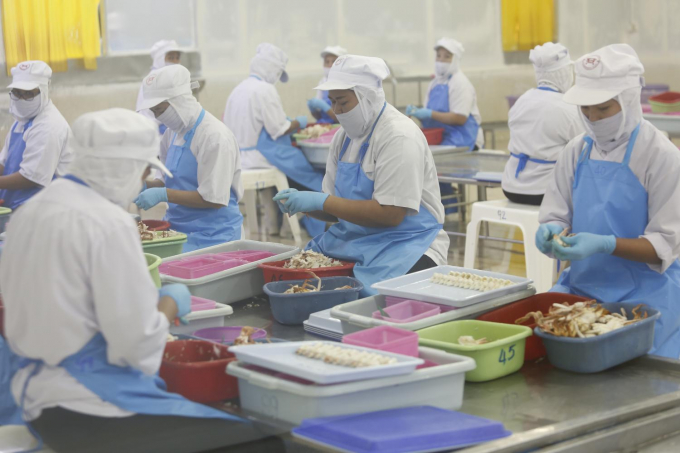May 30, 2025 | 00:15 GMT +7
May 30, 2025 | 00:15 GMT +7
Hotline: 0913.378.918
May 30, 2025 | 00:15 GMT +7
Hotline: 0913.378.918

Workers process seafood at one of the country's seafood processing plants. The agri-food industry accounted for one-quarter of the Thai economy and employed almost half of the workforce in 2019 prior to the pandemic. Photo: Pattarapong Chatpattarasill
Thailand's agri-food sector contracted by 6% or 228 billion baht last year with a corresponding decline of 8% or 730,000 people in its workforce, largely due to the effects of the Covid-19 pandemic, according to a report by Oxford Economics.
The nation's agri-food sector is facing the third most challenging -- after Phillippines and Indonesia -- recovery in a region of 10 countries, scoring 4.9 out of 10 in the report's Economy Recovery Matrix.
The country's food industry is especially vulnerable because of its dependence on tourism, which accounted for 9.5% of Thailand's total food consumption in 2019, however, international tourists are not expected to return to pre-pandemic levels until at least 2024.
Visit Limlurcha, chairman of Food Processing Industries Club of the Federation of Thai Industries, said this is a worrying scenario for the recovery of an industry that in 2019 accounted for one-quarter of the economy or 4 trillion baht, employed almost half of the workforce (17.9 million people), and contributed more than 708 billion baht in taxes.
"The report shows just how vital the agri-food sector is to Thailand's economy. While the sector's contribution shrank because of the pandemic, it contracted by less than the economy as a whole. The industry is fully committed to working with the government to ensure we play a critical role in post-pandemic recovery and that the agri-food sector remains a key driver of the economy," Mr Visit said.
According to Matt Kovac, executive director of Food Industry Asia (FIA) that commissioned the report, the government must recognise the current and future risks agri-food companies face before developing policies and implementing measures to drive post-pandemic recovery. Unintended policy consequences could easily scuttle the agri-food industry and Thailand's economic recovery plans, potentially leading to rising business and consumer costs and cause the closure of businesses and unemployment.
"Thailand's agri-food sector will face strong headwinds next year, including a slump in food and beverage demand as well as long-term challenges that will linger beyond the pandemic," he said. "Policymakers must consider such issues before introducing policies that could potentially hamper the agri-food sector's recovery given the scale of the industry's contribution to Thailand's economy and the job market."
The report notes that Thailand's sales tax rates are low when compared with global standards, which increases the risk of a sales tax hike as a way to finance public spending needed to support recovery. This puts the country most at risk in Asia from post-Covid fiscal adjustments, according to the report's Fiscal Risk Assessment Framework.
"Thailand's agri-food sector faces significant risks from any fiscal adjustment, especially given its vulnerable state due to the effects of the pandemic," said James Lambert, director of economic consulting in Asia for Oxford Economics. "It is important for any fiscal policy to be implemented after careful planning, design, and communication, which we have seen through the government's existing Covid-19 policies to support businesses, including those in the agri-food sector."
(BKP)

(VAN) Vikas Rambal has quietly built a $5 billion business empire in manufacturing, property and solar, and catapulted onto the Rich List.

(VAN) Available cropland now at less than five percent, according to latest geospatial assessment from FAO and UNOSAT.

(VAN) Alt Carbon has raised $12 million in a seed round as it plans to scale its carbon dioxide removal work in the South Asian nation.

(VAN) Attempts to bring down the price of the Japanese staple have had little effect amid a cost-of-living crisis.

(VAN) Fourth most important food crop in peril as Latin America and Caribbean suffer from slow-onset climate disaster.

(VAN) Shifting market dynamics and the noise around new legislation has propelled Trouw Nutrition’s research around early life nutrition in poultry. Today, it continues to be a key area of research.

(VAN) India is concerned about its food security and the livelihoods of its farmers if more US food imports are allowed.